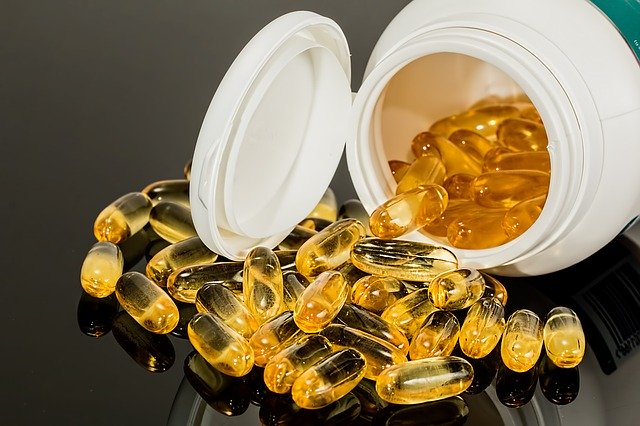A very important sports supplement for football players is Fish Oil. Players can consume Fish Oils by taking supplements or eating fish.
You may have heard of people supplementing with fish oils to improve joint, brain, heart and eye health.
However, football players use this extremely popular supplement to help with inflammation after a tough training or gym session.
Research also suggest that fish oil can help to improve range of motion and muscular strength aswell.
So, if you want to find out if this supplement can help your game and training efforts then we’ve got you covered.
Lets get started…

What is Fish Oil
Fish Oil is found in the tissue of oily fish, with the healthiest options coming from fatty cold water fish. Your body can produce most of the essential fats needed for day to day living, however, it’s not unable to create Omega-3 fatty acids.
And you guessed it….
Omega-3 Fatty Acids are the essential fats for your body.
And when we discuss Fish Oil for sports performance, we are referring to these Omega-3 fatty acids.
The main forms of Omega-3 fatty acids are:
- Eicosapentaenoic Acid (EPA)
- Docosahexaenoic Acid (DHA)
Where are Omega 3 Fatty Acids Found?
As previously mentioned the essential Omega 3 fatty acids can be found in fish. Here are some of the main sources:
- Cod Liver
- Herring
- Mackerel
- Salmon (Research has shown that wild-caught Salmon has more EPA and DHA than farmed Salmon)
- Seal Blubber
- Tuna
- Whale Blubber
Omega-3 fatty acid deficiency ranked as the sixth highest killer of Americans More on this Harvard University Study
Harvard University Tweet
Here’s a great video from Athlean X on the important of high grade Omega-3s for mmuscle recovery.
Fish Oil Benefits
Fish Oil is FDA approved to lower triglycerides levels but is also advised to help many other conditions.
Conditions related to the heart and blood system:
- Lowers blood pressure
- Lowers cholesterol levels
- Lower triglycerides
Preventing heart disease or stroke:
- Bypass surgery
- Chest pain
- Clogged arteries
- Heart failure
- Irregular heartbeat
- Preventing blood clots, and high blood pressure after a heart transplant
- Rapid heartbeat
Kidney-related problems:
- Berger’s disease
- Cirrhosis
- Heart transplantation
- Kidney complications related to diabetes
- Kidney disease
- Kidney failure
Brain Health:
- Alzheimer’s disease
- Attention deficit-hyperactivity disorder (ADHD)
- Bipolar disorder
- Depression
- Developmental coordination disorder
- Epilepsy
- Mental impairment
- Migraine headache
- Post-traumatic stress disorder
- Psychosis
- Schizophrenia
Eye Problems
- Age-related macular degeneration (AMD)
- Cataracts
- Dry eyes
- Glaucoma
Stomach Issues
- Allergy to salicylate
- Behcet’s syndrome
- Crohn’s disease
- Inflammatory bowel disease
- Pancreatitis
- Phenylketonuria
- Raynaud’s syndrome
- Stomach ulcers caused by Helicobacter pylori
Fish Oil is Injection into veins for:
- Blood infection
- Cystic fibrosis
- Pressure ulcers
- Rheumatoid arthritis (RA)
- Scaly and itchy skin (psoriasis)
Fish Oils is also taken for:
- Cancer
- Chronic fatigue syndrome
- Lung disease
- Pneumonia
- Preventing blood vessels from re-narrowing after surgery to widen them
- Seasonal allergies
- Weight loss
Other condition which Fish Oil is used for:
- Asthma
- Autism
- Cystic fibrosis
- Diabetes
- Dyslexia
- Dyspraxia
- Eczema
- Gum disease
- HIV/AIDS
- Lyme disease
- Multiple sclerosis
- Obesity
- Prediabetes
- Preventing weight loss caused by some cancer drugs
- Sickle cell disease
- Systemic lupus erythematosus (SLE)
- Weak bones (osteoporosis)
But how can Fish Oil help football performance?
Fish Oil Benefits for Sporting Performance
So what are some of the key benefits footballers can expect from fish oil supplementation?
- Reduces muscle soreness – Fish oils improve blood flow, which delivers oxygen and other nutrients to muscles and tissues.
- Improves aerobic metabolism due to faster delivery of oxygen – which is great for performing for 90 minutes or even extra time.
- Reduces Inflammation of tissue from muscular fatigue and overexertion – Allowing you to recover quicker after training, or if you have an injury.
- Increases Muscle Synthesis – helping you get bigger and stronger after training
How Much Fish Oil Should You Take
The optimal daily amount of Omega-3 fatty acids is:
1.3 – 2.7g of Omega-3 Fatty Acids (not fish oil tablets) per day.
This is the ideal amount for an everyday diet.
But Remember…
This recommendation is 1.3 -2.7g of Omega-3 Fatty acids and not just Fish Oil tablets.
As with a lot of supplements on the market, you always need to check the labels. The amounts of Omega -3 fatty acids vary from product to product, with many have very low percentages.
So…
Always look for fish oils that have adequate amounts of:
-
- EPA
- DHA
- Cod Liver Oil
- Shark Liver Oil
Fish Oil Does have a few Side Effects
There are a few side effects that may come from Omega-3 Fish Oil, these include:
- Fishy breath
- Fishy taste in your mouth
- Loose stools
- Nausea
- Stomach upset
- Consuming more than 3g a day can cause problems














